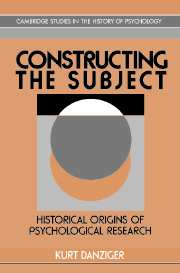Book contents
- Frontmatter
- Contents
- Preface
- 1 Introduction
- 2 Historical roots of the psychological laboratory
- 3 Divergence of investigative practice: The repudiation of Wundt
- 4 The social structure of psychological experimentation
- 5 The triumph of the aggregate
- 6 Identifying the subject in psychological research
- 7 Marketable methods
- 8 Investigative practice as a professional project
- 9 From quantification to methodolatry
- 10 Investigating persons
- 11 The social construction of psychological knowledge
- Appendix
- Notes
- Index
3 - Divergence of investigative practice: The repudiation of Wundt
Published online by Cambridge University Press: 18 September 2009
- Frontmatter
- Contents
- Preface
- 1 Introduction
- 2 Historical roots of the psychological laboratory
- 3 Divergence of investigative practice: The repudiation of Wundt
- 4 The social structure of psychological experimentation
- 5 The triumph of the aggregate
- 6 Identifying the subject in psychological research
- 7 Marketable methods
- 8 Investigative practice as a professional project
- 9 From quantification to methodolatry
- 10 Investigating persons
- 11 The social construction of psychological knowledge
- Appendix
- Notes
- Index
Summary
Wundt's limitations on introspection, experiment, and scientific psychology
Wundt's historical role was in some ways akin to the fate of the sorcerer's apprentice. He successfully mobilized some very effective practical techniques in the service of certain limited goals, but then found that these techniques turned into forces that had passed completely out of his control and were about to destroy the very framework within which he had put them to work. This was true of the link between introspection and experiment, which he advocated, and of the form of experimental psychology that he put into practice. Wundt, as has been observed, had many students but no genuine disciples. If he was the father of a discipline, he was a father whose fate is more reminiscent of the myth of Totem and Taboo than the myth of Chronos. Virtually everything that happened in modern psychology was a repudiation of Wundt, explicitly or implicitly. To understand this process, we must try to understand its starting point, namely, Wundt's conception of psychological practice.
Wundt's theory and practice of introspection diverged quite sharply from that of many of his students. On this issue (as on several others) he never emerged from the shadow of Kant, which meant that he basically accepted the object of knowledge to which the method of introspection corresponded but denigrated the method itself. He never doubted that the private consciousness was the object that psychology had to study, but he agreed with Kant and later critics like Comte and Lange that introspection was not the instrument that would transform this object into a scientific object.
- Type
- Chapter
- Information
- Constructing the SubjectHistorical Origins of Psychological Research, pp. 34 - 48Publisher: Cambridge University PressPrint publication year: 1990

